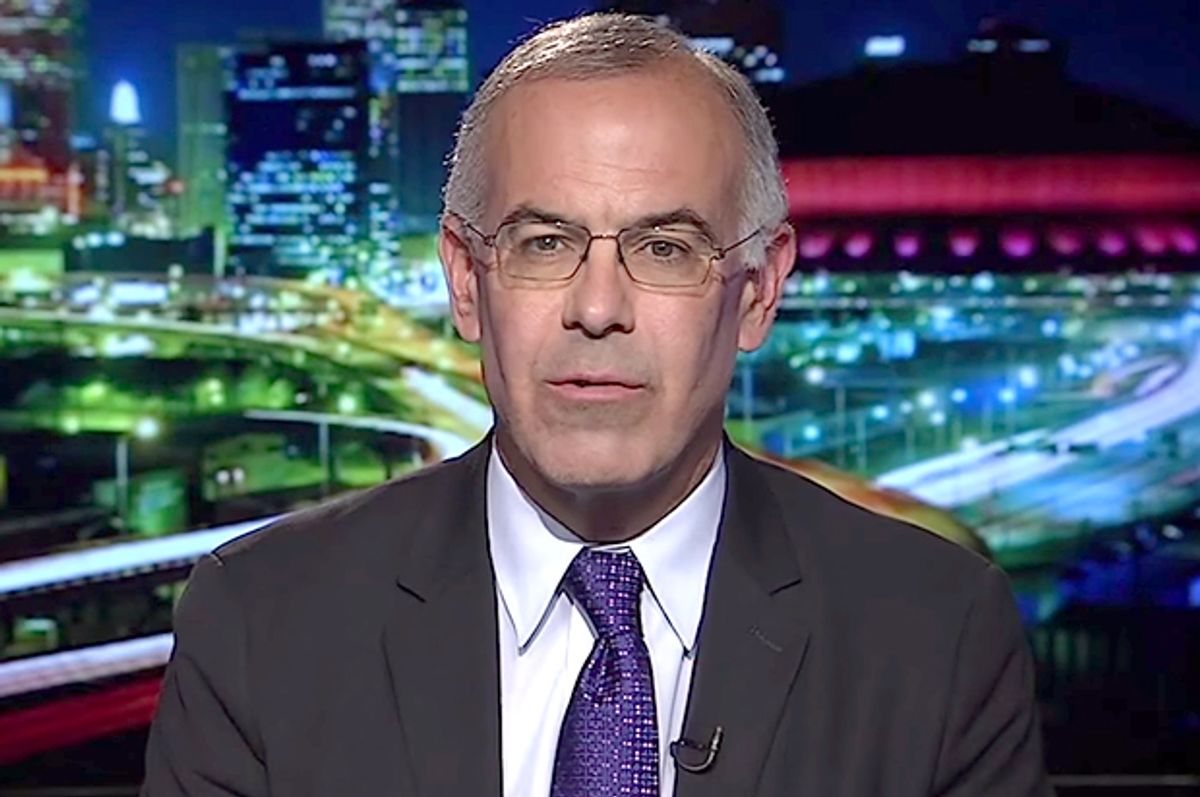Now that Ross Douthat has overtaken him as the New York Times columnist liberals love to hate-read, David Brooks may no longer wield the same influence that he did in his “Bobos in Paradise” or red state/blue state prime. But even if he can feel death’s clammy hand on his shoulder, that hasn’t diminished Brooks’ signature talent, which is finding strange, subtle and idiosyncratic ways to be wrong. Look no further than his most recent column — a tossed-off and confused assertion that the nastiness of police unions represents a philosophical challenge to the pro-labor left — for an especially illuminating case in point. Because while Brooks is in many ways right about the deleterious effects police unions can have on American society, he’s simply wrong about who’s pushing for reform and who’s choosing instead to look the other way.
In typical New York Times conservative style, Brooks begins the piece by (under)stating the obvious, as if doing so was a magnanimous ideological concession. “Over the past decades,” Brooks writes, “the case for enhancing union power has grown both stronger and weaker.” On the stronger side, Brooks says, is the fact that “wages have stagnated while profits have soared,” which, he grants, does make it “seem” like the “balance of power between labor and capital” is “out of whack.” And on the weaker side? “[U]nions, and especially public-sector unions,” according to Brooks, “have done a lot over the past decades to rigidify workplaces, especially government.” He cites teachers’ and police unions as evidence.
Since the rise of the New Left in the 1960s, if not before, U.S. liberals have been reflexively skeptical of cops and their unions. (Memories of the “police riot” at the 1968 Democratic National Convention are likely among the biggest reasons.) And with the killings of Michael Brown, Eric Garner and Tamir Rice having placed criminal justice reform at the forefront of the left’s agenda, Brooks has picked a great time to try to weaken liberals’ abstract support of unions with a badge-shaped wedge. After he lists a series of reforms supported by liberals but thwarted by unions — common sense stuff like “getting rid of bad cops,” making police wear body cameras and demilitarization — Brooks argues that “the left” won’t speak out against cop unions “because they’re unions.” But if Brooks took just a cursory glance at recent police-related headlines, he’d see that that’s the opposite of the truth.
Look at the response to the Tamir Rice killing, for instance. After the 12-year-old African-American Cleveland resident was shot dead by Officer Timothy Loehmann, a noted incompetent who was allegedly frightened by the child’s toy gun, the loudest voices demanding immediate and thorough reform of the department came primarily from the left. The Ohio chapter of the NAACP called for change; Attorney General Eric Holder’s Department of Justice released its sadly well-timed report on the Cleveland PD’s bad practices; and former Democratic presidential candidate Al Sharpton, who’s now better known as a TV pundit, incorporated the Rice family into his march on Washington. And when Cleveland police union chief Jeffrey Follmer revealed himself to be a brutal authoritarian with the moral compass of a goon, it was due to tough questioning from Ari Melber, a colleague of Sharpton’s at the left-of-center MSNBC.
For an even more recent example, see the drama that’s still unfolding right now between Bill de Blasio, New York City’s unapologetically liberal mayor, and the most stubborn, entitled and defensive members of the NYPD. When de Blasio noted that he’s worried at times about how cops will treat Dante, his African-American teenage son, the head of the Patrolmen’s Benevolent Association hyperbolically told the media that the mayor had “thrown [the NYPD] under the bus.” And when de Blasio broke from recent tradition by declining to prostrate himself and beg forgiveness, the union went nuclear, circulating a petition asking him not to attend its signatories’ funerals if they’re killed on the job. De Blasio called the union’s behavior “disappointing,” while the union’s chief said the mayor was trying to lead “a fucking revolution.”
My point here isn't to say that the pushback of cops and their unions has come exclusively from the left. It hasn’t. Some libertarian-leaning conservatives, who are usually Brooks’ most vocal right-wing critics, have been good on the issue (Sen. Rand Paul and the magazine Reason particularly stand out). Instead, what I hope to make clear is that Brooks’ description of an American left too dogmatically pro-union to decry our burgeoning police state is, like the salad bar at Applebee’s, something the celebrated columnist simply made up. In fact, if Brooks is looking to find a politician giving a police union special treatment, he’d do well to check out Wisconsin, where GOP Gov. Scott Walker, who’s long enjoyed the support of the state’s police unions, included in his union-busting bill an exemption for firefighters and cops. Brooks says the right protects police unions "because they represent law and order." Surprising no one, Brooks evidently finds that reason good enough.

Shares